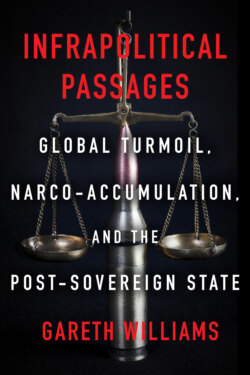Infrapolitical Passages

Реклама. ООО «ЛитРес», ИНН: 7719571260.
Оглавление
Gareth Williams. Infrapolitical Passages
Отрывок из книги
INFRAPOLITICAL PASSAGES
FORDHAM UNIVERSITY PRESS NEW YORK 2021
.....
The reading in question is extended in particular reference to Empire’s primary libidinal principle, which is the figuration of emancipation even from within the fact that, according to the authors, Empire not only contains counter-Empire but is the container. In other words, global capitalism, or Empire, is the achievement of capital’s own outer limit, while sovereignty remains the antagonistic container of the multitude and also its boundary (Moreiras, Línea de sombra, 206–7). It is from within this historical and conceptual conundrum that Moreiras begins to address the problem of the metaphysics of counter-Empire as a promised overcoming from within Empire’s fulfillment of Empire itself. This is the question that dwells at the heart of Hardt and Negri’s work, yet it remains largely un(re)marked, to the extent that it is presented merely as a transcendent given or as the logical and inevitable outcome of Empire in much the same way the communist “Idea,” or the True Life, is in Badiou’s recent writings.
While Empire’s presentation of the totalization of subsumption is laudable (and is perhaps consonant with the overall diagnosis also contained here in Infrapolitical Passages, though always with a divergent vocabulary, differential prognoses, and contrary hermeneutic responses), questions begin to emerge around Hardt and Negri’s figuration of the biopolitics of the multitude as the always immanent, and therefore always potentially transcendent, counterempire to the biopolitics of global capital.11 How, asks Moreiras, can the conditions of a transcendent counterbiopower—the multitude—be thought from within the total subsumption that is Empire, when the latter is already biopower at its absolute planetary limit? How could such a thing—the primacy of an immanent and future counter-Empire—bring an end to subalternity when “in Empire the end of subalternity is willfully and messianically affirmed while remaining theoretically unfounded” (213)? In other words, what price does thinking pay in the wake of Hardt and Negri’s “frankly optimistic intellectual position” regarding counterempire as the subjectivist precondition for the surmounting and overcoming of Empire (215)?
.....